Chernobyl disaster: 'I didn't know the truth'
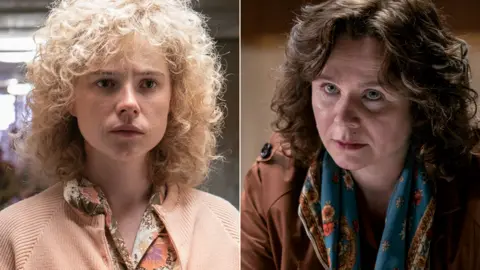 Sky UK Ltd/HBO
Sky UK Ltd/HBOIt was the site of the world's worst nuclear accident. In 1986, a reactor at the Chernobyl nuclear power station in then Soviet-controlled Ukraine exploded, sending a radioactive plume across Europe.
The effects were devastating and the disaster's impact was felt across the world.
The story of the accident - and its human cost - is being brought to the small screen in a Sky-Atlantic drama starring Jared Harris, Emily Watson, Stellan Skarsgård and Jessie Buckley.
Written by Craig Mazin (who also wrote the Hangover film sequels) and directed by Johan Renck (who also directed episodes of Breaking Bad and The Walking Dead), Chernobyl aims to "bring to life the true story of the unprecedented tragedy".
The film follows the fall-out of the explosion and examines both the lives of those in power who tried to hide the truth and those on the outside who hoped to uncover it.
Oscar-nominated actress Watson portrays Ulana Khomyuk, a Soviet nuclear physicist intent on finding out how and why the Chernobyl disaster happened.
"She's an amalgam of the [real-life] scientists who worked on the situation," Watson explains.
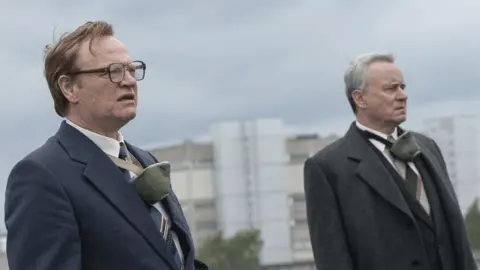 Sky UK Ltd/HBO
Sky UK Ltd/HBO"Her currency is she's a brilliant scientist and if she can get the facts out, he [Soviet physicist Valery Legasov, played by Jared Harris] will recognise the truth. They [those in power] came close to annihilating the whole of Europe.
"[When] they sent me the script, I instantly thought, 'This is brilliant, I want to be part of it.'
"It's seen as an historical event but it's still ongoing," she says.
Ulana appears fearless as she pushes for her voice to be heard amidst a cacophony of Soviet propaganda.
"Her character is from Belarus - they suffered terrible atrocities during World War Two, great swathes of the population were wiped out.
"She would have been a small child at that time and lived through some appalling things. She's very tough and that's made her very strong," Watson explains.
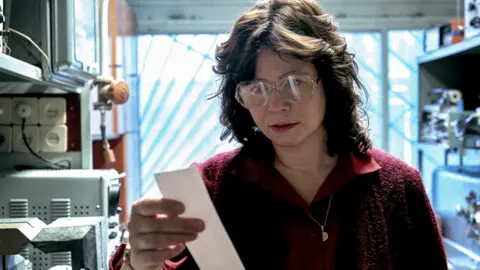 Sky UK Ltd/HBO
Sky UK Ltd/HBO"This is her moment, it's a call to arms. She just takes the attitude that the science doesn't lie."
Buckley, who recently starred in TV drama War and Peace and the film Wild Rose, plays real-life character Lyudmilla Ignatenko.
As the wife of firefighter Vasily Ignatenko, she was one of the first on the scene when the explosion occurred.
Buckley also says that joining the cast was a no-brainer.
"I read the script and was completely blown away by it," she says.
"You just want to do as honest a job as possible."
Indeed, Lyudmilla's anguish and panic as the drama unfolds makes for a harrowing watch.

The legacy of Chernobyl
According to the UN, the event affected more than 3.5 million people and contaminated nearly 50,000 square kilometres of land.
The first emergency workers rushed in as lethal smoke billowed out. Of 134 who were diagnosed with acute radiation sickness, 28 died within months. At least 19 have died since.
It is conclusive that around 5,000 cases of thyroid cancer - most of which were treated and cured - were caused by the contamination.
Many suspect that the radiation has or will cause other cancers, but the evidence is patchy.
Amid reports of other health problems - including birth defects - it still is not clear if any can be attributed to radiation.

The Irish actress hadn't worked with Watson before but their paths had crossed.
"I had met Emily over a coffee through Bafta Breakthrough, they set up a mentor thing - and I just think she's so fantastic. And I said, 'I'm going to do this thing about Chernobyl,' and she said, 'I want to do that!' So that was nice."
Buckley wasn't born when the disaster happened but she says she still "had a relationship with Chernobyl" through her memories of a Chernobyl charity which gives sick children from the area a chance to recuperate in Ireland with host families.
But Watson was a student when it occurred.
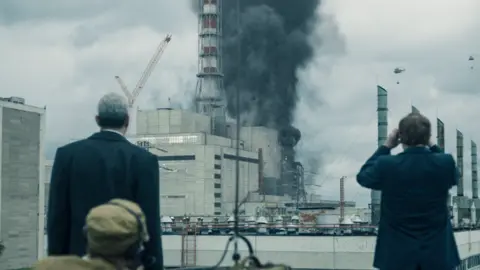 Sky UK Ltd/HBO
Sky UK Ltd/HBO"I remember people at my college were studying in Kiev at the time but I really had no idea of the extent of it or the human sacrifice involved," she says.
"An accident at Chernobyl is not convenient to the powers that be, hence they cover it up. Turns out there was a design flaw all along. There couldn't be more of a warning from history."
Buckley says she "was scared playing Lyudmilla because it's so real and it's so unbelievable what happened".
In fact, she's a revelation in Chernobyl, conveying the impending sense of doom, often with little dialogue.
Hers is the human face of the disaster, a symbol of the impact on ordinary lives - lives which are given little value as politicians and senior plant workers scramble to cover up the truth for their own ends.
Buckley didn't speak to the real Lyudmilla as part of her research ("she wants to get on with her life") but says: "Johan and Craig were so ruthless in making everyone aware of the truth."
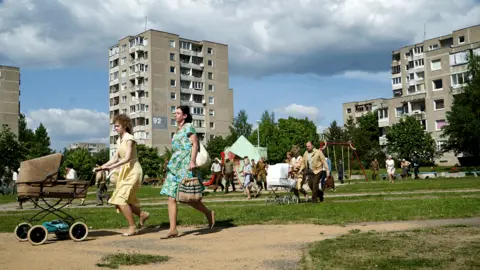 Sky UK Ltd/HBO
Sky UK Ltd/HBOWatson concurs: "I have great respect for Craig and Johan... the amount of research was astonishing. I think it's a brilliant piece of writing."
Buckley also studied first-hand accounts and watched a documentary about her character.
"I felt a huge responsibility playing Lyudmilla, I wanted to tell her story as honestly as I could. I can't even imagine what it must have been like but I really hope I have managed to be as honest and truthful as I can so everyone can realise that lives were lost because of lies.
"It's not an historical event - it's something that happened, that continues to happen. When I open my eyes to it, it's terrifying.
"But also it's [about] the complete sacrifice of these firefighters and [other] people made not to just save themselves but to save the world."
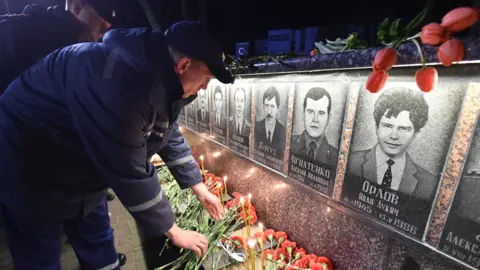 Getty Images
Getty ImagesMost of the series was shot in Lithuania but some filming took place in Kiev.
The reality hit home during one particular shoot.
"It was a graveyard scene," Buckley explains.
"This extra was standing beside me, she was crying. I was really grateful that she wanted to tell this story as well but then she turned to me after and said, 'My son, my son.' This is not make-believe. It's a nightmare."
Watson sees alarming parallels between the situation at Chernobyl and the present day.
"It's a very interesting parable for our times - the political truth is more convenient than what the science is saying. The truth is a very moveable feast.
"It just takes one person to say climate change is a hoax and everyone gives them a platform in the interest of balance.
"As a drama, I hope it will be very successful but I hope it will have a powerful punch in terms of people waking up to what's at stake."
Chernobyl will be available on Sky Atlantic and NOW TV on 7 May.

Follow us on Facebook, on Twitter @BBCNewsEnts, or on Instagram at bbcnewsents. If you have a story suggestion email [email protected].
